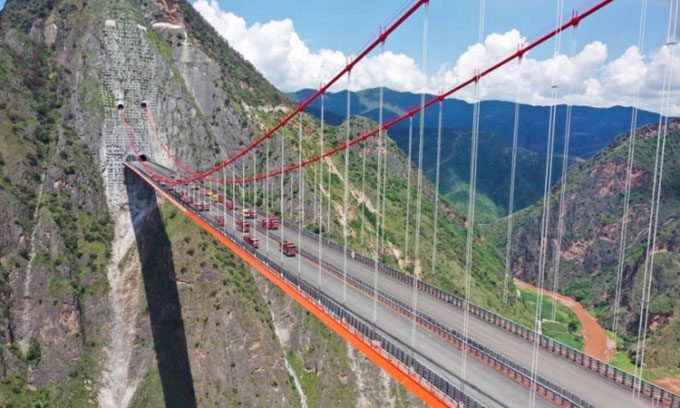The Luzhijiang suspension bridge, measuring approximately 800 meters, has successfully completed a load test with a convoy of trucks carrying a heavy load of 1,280 tons traversing back and forth over 8 days.
The Luzhijiang Bridge, located in Yunnan Province, southwestern China, has passed an impressive load test. During the 8-day trial starting on July 11, trucks loaded with goods weighing up to 1,280 tons continuously moved across the bridge, according to Science and Technology Daily.

The suspension bridge in southwestern China passed the load test on July 18. (Photo: Weibo)
With a length of approximately 800 meters, Luzhijiang holds the record for the longest single-span suspension bridge in the world, significantly reducing travel time between Yuxi City and Shunhua County from 1.5 hours to just 2 minutes. The previous record for the longest single-span suspension bridge was held by the Jinshajiang Hutiaoxia Bridge on the Beijing-Tibet Expressway in western China, which is 766 meters long.
The Luzhijiang Bridge is part of a new 200-kilometer highway through Yunnan aimed at enhancing connectivity with Southeast Asian countries. This project is part of the Belt and Road Initiative—China’s plan to promote regional connectivity and economic integration with over 140 countries.
The bridge features only one supporting tower and spans a deep valley with cliffs rising over 300 meters above the ground. The engineering team responsible for the project noted that the cliffs posed risks of landslides and other geological hazards.
After considering several proposals, the team chose the most challenging option with a single span of 780 meters. When construction began in 2019, engineers were given a three-year deadline. Despite the challenges posed by COVID-19 and multiple lockdowns, they completed the project on time with the assistance of robotics.
Each ultra-long steel cable had to be anchored deep into the mountain with a massive anchor. To place this anchor, engineers drilled a tunnel over 100 meters long into the cliff. Drilling such tunnels in difficult environments typically requires a large workforce with many years of experience.
However, the tunneling time was reduced to just about 4 months thanks to intelligent machinery capable of operating with minimal human intervention, as shared by the project team from the China Railway Bridge Engineering Group in the World Bridge magazine in March. These deep tunnels also allowed the cables to rise at a 54-degree angle, providing additional strength to the bridge.




















































